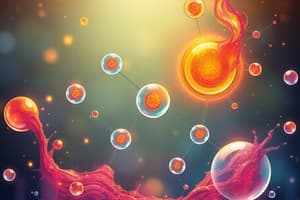Podcast
Questions and Answers
What is the focus of the Class 12 ICSE chemistry syllabus?
What is the focus of the Class 12 ICSE chemistry syllabus?
- Organic chemistry only
- Physical chemistry only
- Inorganic chemistry only
- Organic, inorganic, and physical chemistry (correct)
Which of the following is NOT a fundamental concept studied in Class 12 ICSE physical chemistry?
Which of the following is NOT a fundamental concept studied in Class 12 ICSE physical chemistry?
- Stoichiometry and balancing chemical equations (correct)
- Kinetic molecular theory
- Atomic and molecular spectroscopy
- Equilibrium
Inorganic chemistry primarily deals with the study of:
Inorganic chemistry primarily deals with the study of:
- Ionic compounds only
- Non-carbon compounds and elements (correct)
- Carbon compounds
- Organic compounds
Which branch of chemistry covers topics like periodicity of elements and bonding?
Which branch of chemistry covers topics like periodicity of elements and bonding?
What aspect of inorganic reactions is emphasized in the Class 12 ICSE syllabus?
What aspect of inorganic reactions is emphasized in the Class 12 ICSE syllabus?
What does the Class 12 ISC Chemistry syllabus aim to develop in students?
What does the Class 12 ISC Chemistry syllabus aim to develop in students?
What is the primary focus of organic chemistry?
What is the primary focus of organic chemistry?
Which of the following topics is NOT typically studied in Class 12 ISC organic chemistry?
Which of the following topics is NOT typically studied in Class 12 ISC organic chemistry?
Why is organic chemistry considered vital to industries like pharmaceuticals and materials science?
Why is organic chemistry considered vital to industries like pharmaceuticals and materials science?
What does physical chemistry primarily study?
What does physical chemistry primarily study?
Which of the following topics does physical chemistry likely cover?
Which of the following topics does physical chemistry likely cover?
Why is a study of physical chemistry essential to understanding chemical reactions?
Why is a study of physical chemistry essential to understanding chemical reactions?
Flashcards are hidden until you start studying
Study Notes
Exploring the Chemical World: An Overview of Key Branches and Class 12 ISC
Chemistry, a fascinating and essential science, delves into the composition, properties, and transformations of matter. To better understand the breadth of this discipline, let's examine its major branches and how they intersect with the Indian Certificate of Secondary Education (ICSE) Class 12 curriculum.
Organic Chemistry
Organic chemistry deals with carbon-containing compounds and their derivatives, which are ubiquitous in living organisms. This branch is concerned with the study of organic molecules' structure, reactivity, and synthesis. Organic chemistry forms the foundation for understanding biological processes and is vital to pharmaceutical, agricultural, and materials science industries.
Some essential topics studied in Class 12 ICSE organic chemistry include:
- Bonding and hybridization
- Functional groups and their reactivity
- Nomenclature and isomerism
- Acids and bases
- Synthesis of organic compounds
- Reaction mechanisms
Physical Chemistry
Physical chemistry is the science of understanding the fundamental principles and theories that govern the behavior of matter and its transformations. This branch covers topics such as thermodynamics, statistical mechanics, quantum mechanics, kinetics, and electrochemistry.
Some fundamental concepts studied in Class 12 ICSE physical chemistry include:
- Kinetic molecular theory
- Thermodynamics
- Equilibrium
- Reaction kinetics
- Electrochemistry
- Atomic and molecular spectroscopy
Inorganic Chemistry
Inorganic chemistry is the study of non-carbon compounds and the elements. This branch covers a wide range of topics, from the study of fundamental atomic and molecular structure to complex materials science and the synthesis of high-tech materials.
Some essential topics studied in Class 12 ICSE inorganic chemistry include:
- Periodicity of the elements
- Bonding and electronic structure
- Stoichiometry and balancing chemical equations
- Equilibrium and solubility product constants
- Acid-base neutralization reactions
- Kinetic aspects of inorganic reactions
Class 12 ISC Chemistry Syllabus Overview
The Class 12 ICSE (Indian Certificate of Secondary Education) chemistry syllabus focuses on the fundamental concepts and practical aspects of organic, inorganic, and physical chemistry. The curriculum aims to develop a strong foundation in the subject, preparing students for future studies in chemistry and related fields.
The Class 12 ICSE chemistry syllabus is structured into three units:
- Organic chemistry
- Inorganic chemistry
- Physical chemistry
Each unit consists of several topics, with a strong emphasis on practical laboratory work and the application of theoretical concepts to real-world scenarios. The syllabus also includes a section on the history and development of chemistry, providing students with a deeper understanding of the subject's evolution.
Conclusion
Exploring the diverse realms of organic, inorganic, and physical chemistry not only provides a strong foundation for further studies but also an appreciation for the essential role chemistry plays in our daily lives. The Class 12 ICSE chemistry curriculum offers students an opportunity to delve into these fascinating branches of chemistry, laying the groundwork for further exploration and discovery.
Studying That Suits You
Use AI to generate personalized quizzes and flashcards to suit your learning preferences.




